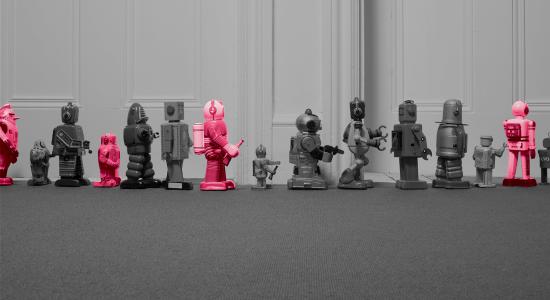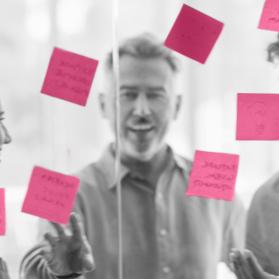The coronavirus crisis has given us all pause for thought. Our main concerns focus on the people who have been infected, the weak and vulnerable, all of whom acutely need help and a new perspective of hope. In view of the severity of the outbreak of the crisis, all the talk of the “VUCA” world (volatility, uncertainty, complexity, ambiguity) that the consultancy business in particular has been enthusiastically preaching in recent years suddenly appears to be little more than empty platitudes. So much is changing in our social interaction, in the relationships between citizens and state, between companies and state, and certainly in the one or the other socio-political and/or economic view of the world.
Some companies and their business models are on the brink of collapse because they have become irrelevant and/or incapable of surviving in these radically changed circumstances. They include players from industries that have been under threat for some time such as brick-and-mortar retail trade and companies from sectors such as automotive manufacturing or aviation that were already facing tremendous pressure to transform owing to the climate debate, but startups such as Flixbus or Uber, highly praised as models for the future, are struggling as well. And we, the consultants, who have long championed our business model with the mantra “Consulting is People Business,” must also ask ourselves how projects can be acquired and carried out when people are no longer allowed to meet each other.
When buzzwords lose their appeal, the simple, tried-and-proved principles often turn out to be as powerful as ever. “Necessity is the mother of invention” was true long before professors, digital influencers, and consultants declared innovative ability to be a problem zone for every company and insisted that all future projects had to be disruptive and exponentially scaling. We currently see many small examples demonstrating the power of entrepreneurial creativity; under normal circumstances, they would never have been considered worthy of mention in the press. We are impressed by the ingenuity displayed by small and medium-sized companies in particular as they strive to maintain business operations and to serve their customers. The obvious place to start is the health care industry. Hospitals are reorganizing so that they can be prepared for the worst and the personnel in the sector are personally committed to taking care of their patients, yet they are forced to improvise to secure a lot of their supplies and their own protective equipment. They deserve the highest respect from us!
Creative ideas and emergency plans
But even apart from those at the very heart of the storm, many companies are succeeding in keeping their businesses alive with creative ideas and emergency plans. Many schools were among the first to go online, and teachers are finding ways to keep children interested and motivated. Conferences and workshops have been hastily organized as webinars or online meetings, and these actions are helpful indeed. Fitness clubs and performing artists have begun to stream their services, and their customers and audiences are grateful. Tradesmen offer remote support for making minor repairs, and customers are even learning how to do things themselves. Car and bicycle dealers with an affiliated service center have set up click-and-collect models that secure the mobility of their customers. Food retailers, who previously seemed to be paralyzed by the market power of Amazon and similar companies, are providing delivery services for a small fee, and many customers, especially the older generation, are delighted by this reassurance that their supply channels will not be cut off.
Many of these services, some of them improvised, are eagerly accepted. Why should companies not continue to provide them on a permanent basis? Some use cases (especially if their presently improvisational nature becomes more carefully structured) can be turned into the basis for completely new or extended business models. The same can be said – even more forcefully – about the major transformations that are currently reshaping supply chains, logistics, and production.
As challenging as the crisis is and as much as it is impacting us at the moment, it is more important to learn the right lessons from it. The creativity and innovative thinking that we see all around us during this crisis can and must be essential factors in this process. A return to a modified pre-crisis model – slightly larger warehouses, an online or delivery service grafted onto current structures, slightly greater depth to our own added value, slightly shorter supply chains in combination with occasional working from home – will neither prepare us adequately for the next crisis (which by definition will be different from the present one) nor address the behavior of customers and employees that has changed in response to the crisis. The management and optimization parameters we have used up to now to optimize our society and economic life will equally be of little help in preparing us for future crises and in making the right decisions when they occur.
Catalyst for resilience
We should use the crisis as a catalyst for the development of business models that are characterized by adaptability, agility, and resilience. That includes the implementation of steering models such as OKRs that are not based on pseudo-exponential growth fantasies over a period of a number of years – which always presuppose an unchanging environment – but instead set motivational targets while allowing for deviations and adjustments.
We should not make the mistake of looking to seamless and complete digitalization for our salvation; truly essential is the intelligent combination of human action with digital information processing. No hospital can function without doctors and nurses; e-commerce, which currently ensures supply channels, cannot function without warehouse workers and delivery drivers. Digital-only platform business models such as Uber, Flixbus, and Airbnb find themselves in trouble because platforms that are unable to bring people together rapidly lose value in pandemic times.
Focus on people
Our attention must focus on people. This is mandatory for the creation of added value and digitalization as well as for ensuring the good health of us all. This crisis will cause a rise in value and demand of digital learning, digital shopping, digital culture and entertainment, and digital information services. But at the same time, we all can hardly wait for the time when we are able to get together again with family, friends, and like-minded people in a restaurant, a concert hall, and even a well-made shopping world. We consultants are currently working from our homes as well as we develop virtual design thinking formats and other channels that will enable us to stay in digital dialogue with our clients. But just like everyone else, we are looking forward to the day when we can again take trains and planes and, armed with Post-Its and the like, sit down in one room with our clients and together tackle the entrepreneurial challenges facing us all.
We are convinced that even in this crisis ideas and business model approaches are emerging that will have a major impact on developments after the crisis. All those who later succeed in exploiting the creativity that they are at the moment investing in the top priority – the survival mode – for the turnaround, the restart, and the transformation after the crisis will emerge at the end of the tunnel with greater strength. In this sense, the present is definitely the hour of the crisis managers, the much-invoked doers. But it should and must also be the hour of creatives and innovators who recognize the long-term levers in the transformation and use them in creating a vision of the future. Every crisis can be a teacher; whether we take its lessons to heart depends solely on our attitude.
Whether acute crisis measures, step-by-step adaptations of business models, cooperation with partners who had never previously been considered, new digital services, or radical visions for a completely new beginning – the crisis generates strong momentum compelling us to consider thoughtfully our own strategies. Take advantage of this momentum.









